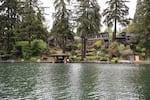An Oregon judge has issued a ruling that effectively makes the waters of Oswego Lake open to the public, though it could be appealed. The decision issued Wednesday finds the city of Lake Oswego’s ordinance that blocks public access to the lake violates state law.
Access to the lake is restricted to members of the Lake Oswego Corporation, which is primarily made up of people who own properties — most of them large, pricey homes — that surround the water. City residents can access a seasonal swim park on Oswego Lake. The general public is not allowed to enter to swim, fish or boat.
Clackamas County Circuit Court Judge Kathie Steele began her seven-page opinion noting that in the past, women weren’t judges or attorneys; old property deeds used to prohibit the sale or ownership to people of color; Congress didn’t prohibit gender discrimination in public schools until 1972; women in Oregon weren’t allowed to open bank accounts without their parents or husbands as co-signers until 1974 and couples of the same gender couldn’t legally marry one another in Oregon until 2014.
“Life changes,” Steele wrote. “The issue before the court here is, under current laws, regulations, and rules, has life changed enough to affect how we treat and protect the public’s interest in Oswego Lake.”

Small metal signs adorn steps leading down to Oswego Lake's shore in a public park read: “Private Lake – Please stay on the steps.” Access to Oswego Lake is restricted to city residents only.
Conrad Wilson / OPB
Steele acknowledged that the city can set limits on access, but said the current restrictions go too far.
“Managing the risks is reasonable in Oswego Lake,” Steele wrote. “Banning the public outright is unreasonable.”
In April, a Clackamas County jury found the city’s law barring access was too restrictive. Steele wrote in her opinion she “recognizes the jury verdict,” which was technically advisory. Steele’s opinion, however, is binding.
The case dates back to 2012, when kayaker Mark Kramer and open-water swimmer Todd Prager challenged the city’s rules in a lawsuit.
“The court’s thoughtful decision reaffirms an important principle of Oregon law and one of our state’s values: that our rivers, lakes and streams belong to the people,” said Nadia Dahab, an attorney representing Prager and Kramer.
Lake Oswego Corporation Board President Justin Harnish said it was willing to work with the city and plaintiffs to try and find a solution that works for everyone.
“The Court’s opinion makes no secret of the fact that it is trying to change decades of established law in Oregon,” Harnish said in a statement Thursday. “We think that is wrong, and we hope that the Oregon Court of Appeals and Supreme Court will respect local governments and the long-recognized property rights of Oregonians.”
The city didn’t immediately return OPB’s request for comment.
Attorneys for the city argued the parks along the lake provided the public with “visual access to the lake.” The city said in its legal briefs that it was “objectively reasonable” to prohibit physical entry into the lake because the city designed the parks for “events and gathering spaces.”

Access to Oswego Lake is limited to Lake Oswego residents. There’s a city-owned swim park for residents. All other access is restricted to members of the Lake Oswego Corporation, a nonprofit made up of the roughly 3,500 homeowners who live around and near the lake.
Conrad Wilson / OPB
Since the case was first filed, it has wound through the courts and broken into two key questions. The first looked at whether the water was subject to the state public trust doctrine. In 2022, a judge ruled Oswego Lake was, meaning the public must have access.
This second looked at whether the city’s restrictions “unreasonably interferes with the public’s right to enter the lake.” As Steele’s opinion makes clear, they do.
“The City needs the opportunity or chance to fix the public access,” Steele wrote. “Clearly, the City may not violate the public trust doctrine and shall correct the violation. The Court has the authority, based on the evidence and jury verdict, to tell the City to take down the ‘No Access’ sign and remove the restrictions.”
Editor’s note: This article was updated Thursday with comment from the Lake Oswego Corporation.


